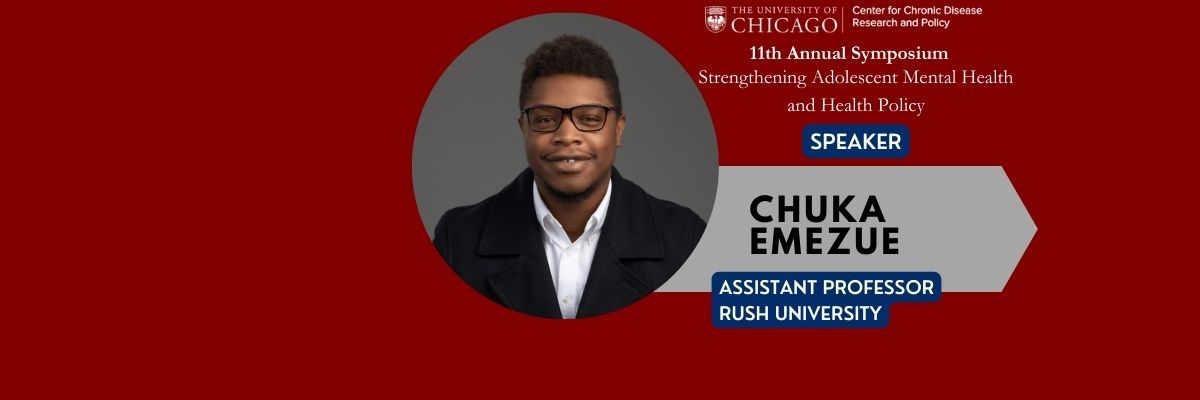October 10, 2023
The Center for Chronic Disease Research and Policy is proud to feature a talk by Chuka Emezue at our 11th Annual Symposium: Strengthening Adolescent Health and Health Policy on October 30. Dr. Emezue will deliver the talk, “Reimagining Trauma- and Equity-Focused Support for Boys and Men on Both Ends of the Gun.” REGISTER HERE.
Dr. Emezue is an assistant professor in the Department of Women, Children, and Family Nursing at Rush University College of Nursing. He holds a PhD in Nursing, a Master of Public Health (MPH), and a Master of Public Affairs (MPA)–all from the University of Missouri-Columbia. His research uses digital and behavioral health programs to improve the health, economic stability, and prospects of boys and men impacted by co-occurring violence, substance use, and mental health disorders. Dr. Emezue has worked on research initiatives with governments and civil society organizations such as the UNICEF Office of Research, the Brady and Anne Deaton Institute for University Leadership in International Development, and the UN Millenium Development Goals (now the Sustainable Development Goals). Currently, he is the founder of the BrotherlyACT™ project, an initiative focused on leveraging technology, career navigation, and mentoring to heal, humanize, & empower violence-impacted youth to lead and enjoy values-based lives.
How did you become interested in child and adolescent mental health?
My early research experiences involved working with domestic violence survivors and victims, specifically mothers and their children. During this work, I noticed that children and adolescents who used violence were often subjected to punishment-based interventions, especially Black teens and young adults. This realization ignited my passion for developing and deploying interventions to support the mental health and well-being of children and adolescents, particularly those exposed to high levels of trauma. I firmly believe in the importance of addressing upstream factors that contribute to the health and well-being of children and youth, aligning with Frederick Douglass’s quote: “It is easier to build strong children than to fix broken men.”
What do you think are the greatest problems youths face regarding their mental health today?
Several syndemic issues are at play. For one, exposure to multi-form trauma and violence in schools, online, at home, and in the community is a crucial public health challenge. However, this issue co-occurs with risky behaviors such as substance use and social comparisons. Some of the solutions we suggest to tackle these problems may inadvertently exacerbate health disparities among children and adolescents. This can potentially perpetuate issues related to avoiding or resisting seeking services, which may persist into adulthood.
What will you discuss in your upcoming talk?
Young Black and African American males (YBM) are disproportionately impacted by the most physically harmful forms of youth violence (YV), including firearm homicides. Yet, in program-rich cities with numerous programs, violence-involved youth report high rates of service resistance and a decline in behavioral health service utilization after age 17. Several racial and structural discrimination mechanisms drive this phenomenon, from service avoidance to disproportionate enforcement of gun laws and interventions. This talk will highlight technology-enhanced modalities to provide trauma- and equity-focused support for boys and men who use and experience violence.
What are you looking forward to at the CDRP symposium this year?
I am excited to learn about the most recent advances, research findings, and new approaches to addressing the mental health difficulties that children and adolescents experience today.
CDRP 11th Annual Symposium: Strengthening Adolescent Mental Health and Health Policy
October 30, 8:30AM-3PM
Gordon Center for Integrative Sciences 3rd Floor Atrium

